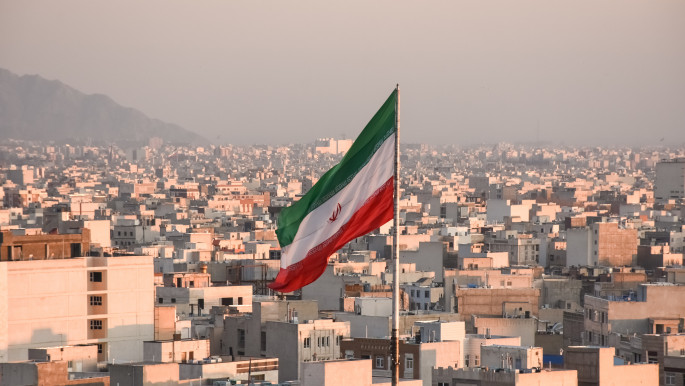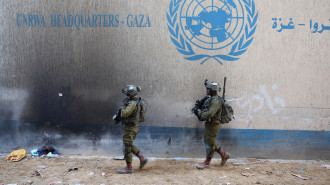
The geopolitical impact of Iran's role in the Ukraine war

In the weeks that followed the Russian invasion of Ukraine in February 2022, there was widespread reporting that Moscow would soon employ thousands of Syrian soldiers on the Ukrainian battlefield.
Others pointed to China’s potential to provide significant economic or military support to Russia, after the two sides announced an “unlimited partnership” in early February.
However, the Syrian troops never materialised and China has been shy about becoming involved in Russia’s military quagmire, even voicing “concerns” about the conflict at a meeting in September with Russian President Vladimir Putin.
Iran, who was previously negotiating with the Biden Administration on the revival of the nuclear deal, initially tried to strike a more nuanced approach to the conflict. Now, as the Iranian regime deals with protests at home, it has shifted course by reportedly supporting Russia’s war efforts against Ukraine.
"Iran has now shifted from rhetoric about friendship with Russia at summits to visibly supporting Moscow in a high-profile military conflict"
Ukraine-Iran relations
In July, the signals indicating the future direction of the Iranian leadership were clear.
Iran’s Supreme Leader, Ayatollah Ali Khamenei, voiced support for the anti-NATO narrative that Moscow has used to justify its invasion of Ukraine. Khamenei praised Putin during his meeting in Tehran, saying, “had you not taken the initiative, the other side would have taken the initiative and caused the war”.
On 19 July, reports emerged that Russian officials were in Iran to explore the purchase of drones for use on the Ukrainian battlefield. It was not long before it became public that Iranian weapons were turning up in Ukraine’s east.
In mid-September, the Ukrainian Defence Ministry tweeted images that showed pieces of the Iranian Shahed-136 drone recovered in the Kharkiv area. Along with emojis of the Russian and Iranian flags, the tweet read: “A perfect union of two despots”.
Statements from US officials highlighting the presence of Iranian military advisers based in Crimea, along with news that Iran is sending more drones and missiles to Russia, has elevated attention about Tehran’s involvement in the European crisis to an unprecedented degree that could have long-term repercussions in global diplomacy.
The new missile shipments reportedly include the Fateh-110 and Zolfaghar missiles, which have a range of up to 700 kilometres.
A signal of Russian military weakness?
Russia has increased the number of missile and drone strikes on Ukraine following the 8 October attack that partially destroyed the Crimean bridge. Overall, the Iranian drones that Russia has used to shore up its fledging war efforts in Ukraine have had little real military impact.
“In general, Ukrainians have a very low opinion of these drones, especially the Shahed 136 Kamikaze (Geran-2 in Russian) drones. They are loud, slow, and not that accurate,” Roland Bartetzko, a former soldier with the Kosovo Liberation Army who is now based in Ukraine to provide logistical support to the Ukrainian military, told The New Arab.
However, the attacks have still wreaked havoc on civilian infrastructure. On 21 October, Reuters reported that 30 to 40 percent of Ukraine’s power infrastructure had been hit in the recent waves of Russian air strikes and that half of the country’s thermal power had been reduced, a bleak situation ahead of winter.
|
|
“The Russians only attack targets that aren’t well protected by anti-air defence weapons. The Shahed 136 is incapable of penetrating air defence that is set up around vital military infrastructure,” Bartetzko added.
Some have noted that the use of military equipment from Iran has signalled Russia’s own decline as one of the world’s top defence exporters.
“It certainly is a sign of military weakness and desperation when a country that has once prided itself on being one of the most prestigious arms manufacturers on the planet, suddenly has to rely on such cheaply produced low-quality and low-performance weapons,” Bartetzko said.
Furthermore, Ukraine and NATO allies will be using Iranian drones to develop effective countermeasures in order to stop future attacks.
Bartetzko noted, “Some intact Shahed drones fell into the hands of the Ukrainians which allowed them to gain sufficient knowledge of the capabilities, performance, and weaknesses of these weapons. This said, the problem is not the lack of countermeasures; these Iranian drones are relatively easy to shoot down.”
"Apart from testing its drones at scale in a real battlefield situation and demonstrating its military potential to regional rivals, Iran will likely seek a future favour from Moscow in return – possibly in Syria"
Observers have argued that countries that have a long history of experience countering Iranian-made drones, such as Israel, could also help the Ukrainians enhance their defence capabilities. Israel wishes to maintain a degree of coordination with Russia in order to strike Iranian militia elements in Syria.
However, Israel is concerned about the deepening alliance between Russia and Iran and it is still possible that Iran’s arch-nemesis will try to find ways to increase its security assistance to Ukraine. On 21 October, Ukraine’s foreign minister Dmytro Kuleba announced that he had discussed air defence systems and technology with Israel’s Prime Minister Yair Lapid.
Bartetzko explained, “However, because of the vast size of Ukraine and its many settlements, it’s simply impossible to put every house and every village under a protective air-defence umbrella. As a result, these drones still pose a threat to many inhabited but unprotected areas. This won’t change in the near future”.
The international diplomatic impact
On 19 October, the European Union appeared to be prepared to place new sanctions on Iran for supplying drones to Russia. The United States is gravely concerned about Iran’s aid to Russia and is working quickly to provide more aid defence systems to Ukraine.
“Iran’s involvement in the Russian invasion of Ukraine adds another dimension to an already strained relation between the EU, its member states, and Iran next to Tehran’s regional profile, its repression of protests and the nuclear deal negotiations,” Erwin van Veen, a senior research fellow with the Clingendael Conflict Research Unit, told The New Arab.
“Yet, Ukraine is not a core theatre for Iran and it basically copies what the US and the EU are doing on the Ukrainian side – supplying military equipment to turn the tide of war,” he said.
How Iran will gain from increasing its involvement in Ukraine is likely to fall into other diplomatic issues, such as Syria or the nuclear negotiations.
|
|
“Apart from testing its drones at scale in a real battlefield situation and demonstrating its military potential to regional rivals, Iran will likely seek a future favour from Moscow in return – possibly in Syria,” van Veen said.
Recently, Russia has attempted to pressure Iranian military elements in Syria to vacate certain areas in order to reduce the number of Israeli airstrikes on Assad regime targets. This comes as Russia is reducing the size of its own force in Syria in order to reinforce its position in Ukraine.
Van Veen explained, “It is unlikely that the EU will directly link Iranian involvement in Ukraine with the nuclear deal negotiations, contrary to Tehran’s recent threat to do so itself.” However, he noted, “Iran’s involvement in Ukraine will just worsen overall perceptions of Tehran in Paris, Brussels or Berlin”.
Iran’s involvement has led to a debate in the United States on whether the Biden administration should cancel the prospect of resuming the nuclear negotiations due to Iran’s involvement in attacking civilian targets in Ukraine.
"As the Iranian regime steps up its involvement in Ukraine and violently represses demonstrations at home, the prospect of a return to the nuclear deal becomes increasingly politically toxic for the US and EU"
US officials have indicated that the talks to restart the nuclear negotiations are not a high priority for the White House at this time due to the ongoing protests in Iran.
John Kirby, a National Security Council spokesperson told the press on 20 October, “And the fact is this: Tehran is now directly engaged on the ground and through the provision of weapons that are impacting civilians and civilian infrastructure in Ukraine, in fact, that are killing civilians and destroying civilian infrastructure in Ukraine”.
As the Iranian regime steps up its involvement in Ukraine and violently represses demonstrations at home, the prospect of a return to the nuclear deal becomes increasingly politically toxic for the US and EU.
“The US and EU are likely better off to stay the course and try to re-conclude the nuclear deal because halting this process just adds the risk of a nuclear-capable Iran to its existing involvement in Ukraine and domestic repression of protests,” van Veen noted.
“There is nothing practical to be gained by stopping negotiations due to Iran’s existing isolation and turn away from the West. Further sanctions are unlikely to make an impression as the current sanctions regime already is comprehensive.”
He said that the protests in Iran are unlikely to lead to positive changes but added, “Yet, new protests are a matter of time. This might give Tehran an incentive to re-conclude the nuclear deal to gain fiscal breathing space. But this will have to wait at least until the result of the US mid-term elections settle down.”
With the winter months approaching, the war in Ukraine’s international dynamics are becoming increasingly complicated.
Iran has now shifted from rhetoric about friendship with Russia at summits to visibly supporting Moscow in a high-profile military conflict.
The long-term prospect of Iran’s involvement in the conflict could upend diplomatic endeavours and shake up the security balance in Europe and the Middle East well into 2023.
Christopher Solomon is a Middle East analyst, researcher, editor, and writer based in the Washington DC area. He works for a US defence consultancy and is the author of the book, In Search of Greater Syria (I.B. Tauris/Bloomsbury). Christopher is a Co-Editor for Syria Comment and a contributor to the Economist Intelligence Unit.
Follow him on Twitter: @Solomon_Chris


![Palestinians mourned the victims of an Israeli strike on Deir al-Balah [Getty]](/sites/default/files/styles/image_684x385/public/2024-11/GettyImages-2182362043.jpg?h=199d8c1f&itok=xSHZFbmc)


![The law could be enforced against teachers without prior notice [Getty]](/sites/default/files/styles/image_684x385/public/2178740715.jpeg?h=a5f2f23a&itok=hnqrCS4x)
 Follow the Middle East's top stories in English at The New Arab on Google News
Follow the Middle East's top stories in English at The New Arab on Google News


